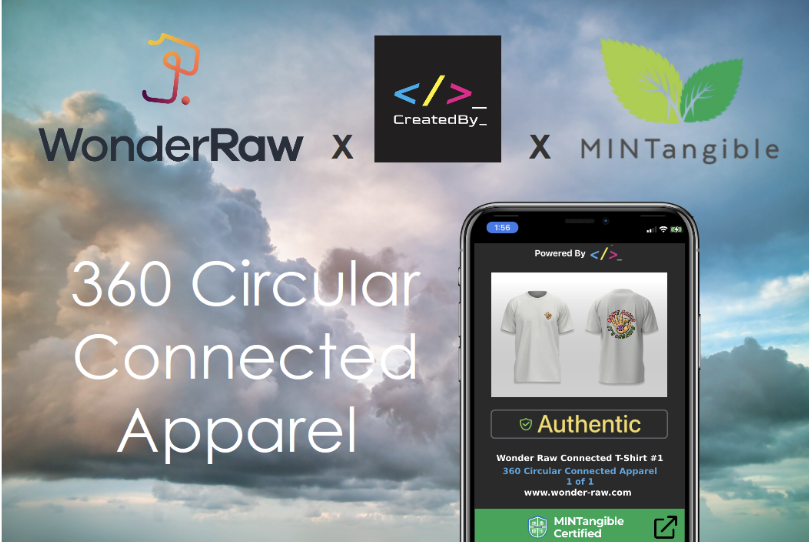The groundbreaking 360° Circular Connected Apparel Case Study was launched on Earth Day, April 22, 2024. It covered the entire lifecycle of six T-shirts produced by Wonder Raw, from sustainable sourcing and manufacturing to consumer engagement and eventual upcycling. MINTangible played a crucial role by tokenizing certifications, IP, and usage rights, thus creating a comprehensive digital identity for each garment.
Throughout their lifecycle, owners interacted with the shirts using the CreatedBy_ Connect ecosystem, creating tokenized memories and participating in the upcycling program. This demonstrated the full potential of CreatedBy_ technology in promoting transparency, authenticity, and ongoing consumer engagement within a truly circular fashion model.
"This case study is the first of its kind to complete a truly 360°circular connected goods journey," said Tom Wallace, CEO of CreatedBy_. "We've not only provided the initial 180° of traceable, sustainable certifications and third-party data of manufacturing and sourcing, but also completed the circle by tracking the garments' lifecycles through to upcycling.”
“There's no excuse for creators or brands not to be creating 360° circular connected goods - the technology is here now, affordable, and scalable," continued Wallace.
The study encompassed the complete 360° lifecycle of six 100% organic T-shirts designed and produced by Wonder Raw, certified by third parties for using 100% organic cotton and vegan inks. Each item was tokenized with these certifications, along with intellectual property (IP) and usage rights, onto the blockchain using MINTangible. CreatedBy_ then encoded and encrypted this data onto NFC tags via their CreatedBy_ Connect iOS app, creating unique digital twins for each shirt.
Six individuals across the United States became owners of these innovative garments. Throughout their lifecycle, owners interacted with the shirts using the CreatedBy_ Connect ecosystem. Two owners created tokenized memories of their experiences—one in Joshua Tree National Park, CA, and another in Las Vegas, NV—which were securely linked to their respective shirts. In a testament to the circular economy concept, five of the six owners chose to participate in CreatedBy_'s upcycling program: they transferred their tokens back to CreatedBy_ and sent the physical shirts for upcycling. Three owners opted to maintain ownership of their newly upcycled items, including one with a tokenized memory, while two others chose to donate their upcycled items to charity.
Threadhaus, based in Los Angeles, has been selected to upcycle two of the shirts for charitable donation, further extending the impact of this groundbreaking process.
Overall, the study demonstrates the seamless integration of blockchain technology, sustainable fashion, and consumer engagement. It provides a blueprint for brands looking to increase transparency, reduce waste, and create deeper connections with their customers.
Throughout their lifecycle, owners interacted with the shirts using the CreatedBy_ Connect ecosystem, creating tokenized memories and participating in the upcycling program. This demonstrated the full potential of CreatedBy_ technology in promoting transparency, authenticity, and ongoing consumer engagement within a truly circular fashion model.
"This case study is the first of its kind to complete a truly 360°circular connected goods journey," said Tom Wallace, CEO of CreatedBy_. "We've not only provided the initial 180° of traceable, sustainable certifications and third-party data of manufacturing and sourcing, but also completed the circle by tracking the garments' lifecycles through to upcycling.”
“There's no excuse for creators or brands not to be creating 360° circular connected goods - the technology is here now, affordable, and scalable," continued Wallace.
The study encompassed the complete 360° lifecycle of six 100% organic T-shirts designed and produced by Wonder Raw, certified by third parties for using 100% organic cotton and vegan inks. Each item was tokenized with these certifications, along with intellectual property (IP) and usage rights, onto the blockchain using MINTangible. CreatedBy_ then encoded and encrypted this data onto NFC tags via their CreatedBy_ Connect iOS app, creating unique digital twins for each shirt.
Six individuals across the United States became owners of these innovative garments. Throughout their lifecycle, owners interacted with the shirts using the CreatedBy_ Connect ecosystem. Two owners created tokenized memories of their experiences—one in Joshua Tree National Park, CA, and another in Las Vegas, NV—which were securely linked to their respective shirts. In a testament to the circular economy concept, five of the six owners chose to participate in CreatedBy_'s upcycling program: they transferred their tokens back to CreatedBy_ and sent the physical shirts for upcycling. Three owners opted to maintain ownership of their newly upcycled items, including one with a tokenized memory, while two others chose to donate their upcycled items to charity.
Threadhaus, based in Los Angeles, has been selected to upcycle two of the shirts for charitable donation, further extending the impact of this groundbreaking process.
Overall, the study demonstrates the seamless integration of blockchain technology, sustainable fashion, and consumer engagement. It provides a blueprint for brands looking to increase transparency, reduce waste, and create deeper connections with their customers.
